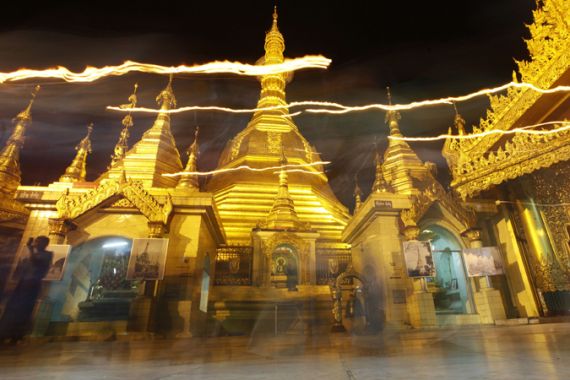Power outage protests hit Myanmar
Hundreds angered by chronic power shortage take to the streets in what is said to be the biggest protest since 2007.

Hundreds have taken to the streets of Myanmar’s major cities to protest continued power outages throughout the country.
The demonstrations, which began on Sunday, reached Yangon, the largest city, on Tuesday evening.
About 75 per cent of Myanmar’s 60 million people are without regular electricity, according to the Asian Development Bank.
Power cuts are a daily occurrence even in Yangon.
Seen as a test of recently announced reforms in the Southeast Asian nation, Tuesday’s protests included an evening march at the Sule Pagoda, the centre of demonstrations in 2007 and 1988 that were crushed by the military which ruled for half a century until last year.
The hour-and-a-half long peaceful demonstration saw protesters lighting candles and praying for electricity as they circled the pagoda.
In the north, an estimated 1,000 people protested for a third straight evening in Mandalay, the nation’s second-largest city.
‘Round-the-clock supply’
The Mandalay protest marks the biggest demonstrations since a 2007 monk-led uprising in which dozens were killed and hundreds arrested.
“Don’t give us reasons. We don’t want any excuses, we just want the results we need. We are demanding round-the-clock power supply for everyone,” Win Cho, a former independent candidate in the 2010 elections said of the chronic power outages in the country.
“We have no electricity sometimes for two days. Even getting drinking water is absolutely difficult,” said Cho Cho Myint, a protester from an eastern Yangon suburb.
Protests are rare in Myanmar, where dissent was suppressed during 49 years of military rule, which ended last March when a reformist, quasi-civilian government, took office.
Demonstrations have since been legalised, although rights groups say the laws are accompanied by tight restrictions, including a requirement to notify authorities several days in advance of a rally.
“I heard about this demonstration to end the electricity issue on the internet hoping the government will notice what citizens are feeling and will find out a way to solve it. As a a citizen, I feel responsible to take part in this demonstration,” said one demonstrator who didn’t give his name.
Deal with China
“The government is in a very difficult position now,” said Aung Thu Nyein, a Burmese economist who moved to Thailand after participating in demonstrations in Myanmar two decades ago.
“These protests are both a sign of dissatisfaction about public services and how the opening of democratic space is
making interest groups more active than before.”
The protesters accuse the former military government of enriching themselves at the public’s expense by selling natural
gas to neighbouring China while Myanmar, among Asia’s poorest nations, faces chronic power outages.
They want the new government to amend those deals, so more natural gas can be used domestically to offset the shortfall.
“Our country is abundantly rich in natural gas but the former military regime sold it to foreign countries without any
consideration for the people,” said Ko Htin Kyaw, a 49-year-old activist after laying a candle under the glowing golden stupa.
“Now the present government, being elected by the people, should try to do something to amend these unfair agreements so enough electricity can be supplied inside the country.”
No arrests
The rallies began Sunday night in Mandalay.
They then spread to Monywa, in the northwest, on Monday and then to Yangon, the commercial capital, on Tuesday.
Activists used social-networking site Facebook to get the word out.
About 50 protesters were briefly questioned by authorities in Mandalay, said Thein Aung Myint, 39, an organiser of the
Mandalay protests.
“The police asked us who was behind us and the purpose of the protests. I told them nobody was behind us. We just staged the protest to demand enough supply of electricity.”
No one was arrested, he said.
State media sought to explain the outages, which have reduced supplies to just four or five hours of power a day in
Mandalay.